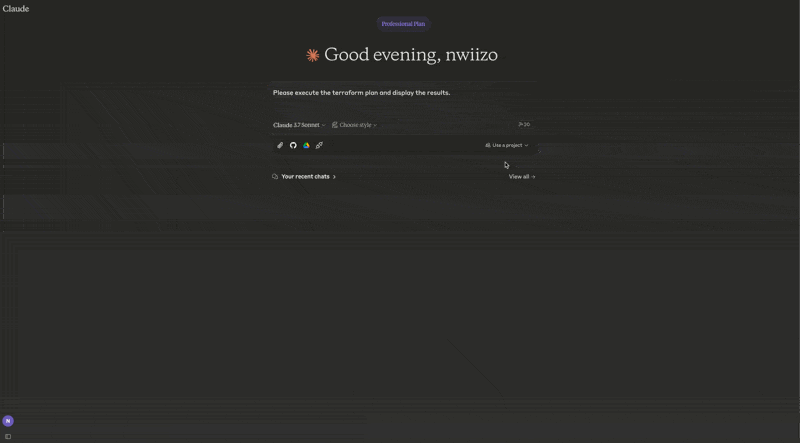Tfmcp: Strumento del Protocollo di Contesto del Modello Terraform
🌍 Strumento del Protocollo di Contesto del Modello Terraform (MCP) - Un tool CLI sperimentale che consente agli assistenti AI di gestire e operare ambienti Terraform. Supporta la lettura delle configurazioni Terraform, l'analisi dei piani, l'applicazione delle configurazioni e la gestione dello stato con integrazione di Claude Desktop. ⚡️
Panoramica
Cos'è tfmcp?
Il ### Terraform Model Context Protocol (MCP) Tool, comunemente chiamato ### tfmcp, è uno strumento sperimentale di interfaccia a riga di comando (CLI) progettato per migliorare la gestione e l'operatività degli ambienti Terraform. Permette agli utenti di leggere le configurazioni di Terraform, analizzare i piani, applicare configurazioni e gestire lo stato, il tutto integrandosi perfettamente con assistenti AI come Claude Desktop.
Caratteristiche di tfmcp
- Integrazione AI: tfmcp supporta l'integrazione con assistenti AI, consentendo una gestione più intelligente degli ambienti Terraform.
- Gestione delle Configurazioni: Gli utenti possono leggere e gestire le configurazioni di Terraform direttamente tramite la CLI.
- Analisi dei Piani: Lo strumento fornisce capacità di analizzare i piani di Terraform, aiutando gli utenti a comprendere le implicazioni delle loro modifiche prima di applicarle.
- Gestione dello Stato: tfmcp consente una gestione efficiente dello stato di Terraform, garantendo che gli utenti possano tenere traccia delle modifiche alla loro infrastruttura in modo efficace.
- Interfaccia Intuitiva: La CLI è progettata per essere intuitiva, rendendola accessibile sia ai nuovi utenti che a quelli esperti.
Come Usare tfmcp
- Installazione: Inizia installando tfmcp da crates.io.
- Configurazione: Configura il tuo ambiente Terraform e assicurati che le tue configurazioni siano pronte per l'analisi.
- Esecuzione dei Comandi: Usa i comandi della CLI per leggere configurazioni, analizzare piani e applicare modifiche. Ad esempio:
- Per leggere una configurazione:
tfmcp read <file_di_configurazione> - Per analizzare un piano:
tfmcp analyze <file_di_piano> - Per applicare una configurazione:
tfmcp apply <file_di_configurazione>
- Per leggere una configurazione:
- Gestione dello Stato: Utilizza tfmcp per gestire efficacemente il tuo stato di Terraform, assicurando che la tua infrastruttura rimanga coerente.
Domande Frequenti
Qual è lo scopo di tfmcp?
tfmcp è progettato per facilitare la gestione degli ambienti Terraform fornendo strumenti per la lettura delle configurazioni, l'analisi dei piani e la gestione dello stato, il tutto integrandosi con assistenti AI.
tfmcp è adatto ai principianti?
Sì, tfmcp è user-friendly e progettato per essere accessibile a utenti di tutti i livelli di esperienza, compresi quelli nuovi a Terraform.
tfmcp può essere integrato con altri strumenti?
Sì, tfmcp è costruito per lavorare insieme agli assistenti AI e può essere integrato in vari flussi di lavoro per migliorare la gestione di Terraform.
Dove posso trovare ulteriori informazioni su tfmcp?
Per ulteriori dettagli, puoi visitare il repository di tfmcp su GitHub o consultare la sua documentazione.
Dettaglio
Configurazione Server
{
"mcpServers": {
"tfmcp": {
"command": "docker",
"args": [
"run",
"-i",
"--rm",
"ghcr.io/metorial/mcp-container--nwiizo--tfmcp--tfmcp",
"./bin/tfmcp --dir terraform-dir --path path"
],
"env": {
"TERRAFORM_DIR": "terraform-dir",
"TFMCP_LOG_LEVEL": "tfmcp-log-level",
"TFMCP_DEMO_MODE": "tfmcp-demo-mode"
}
}
}
}